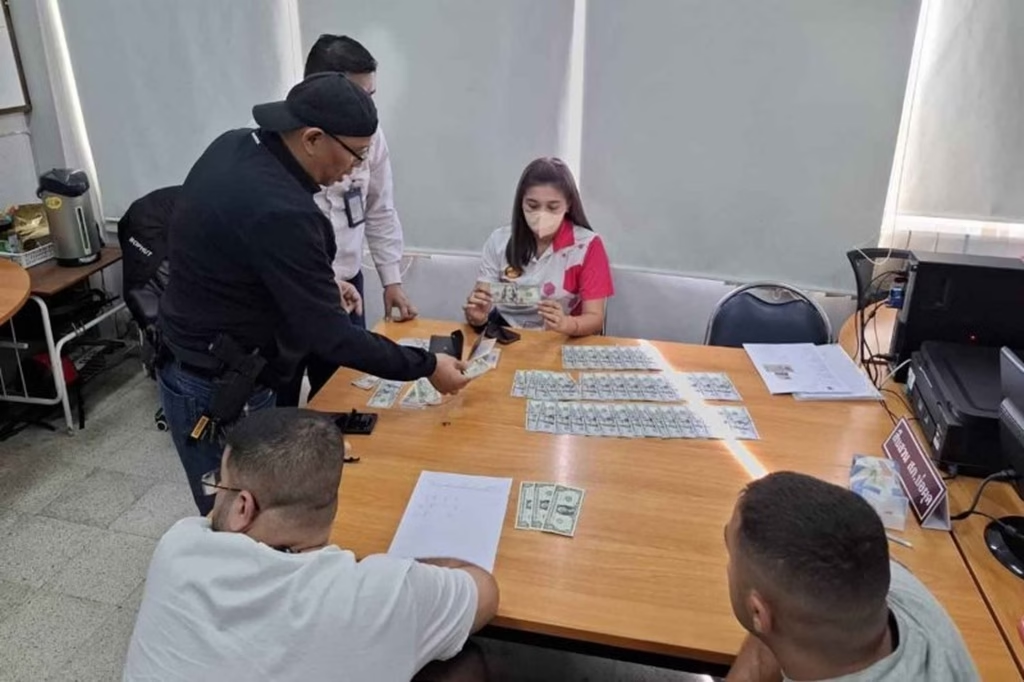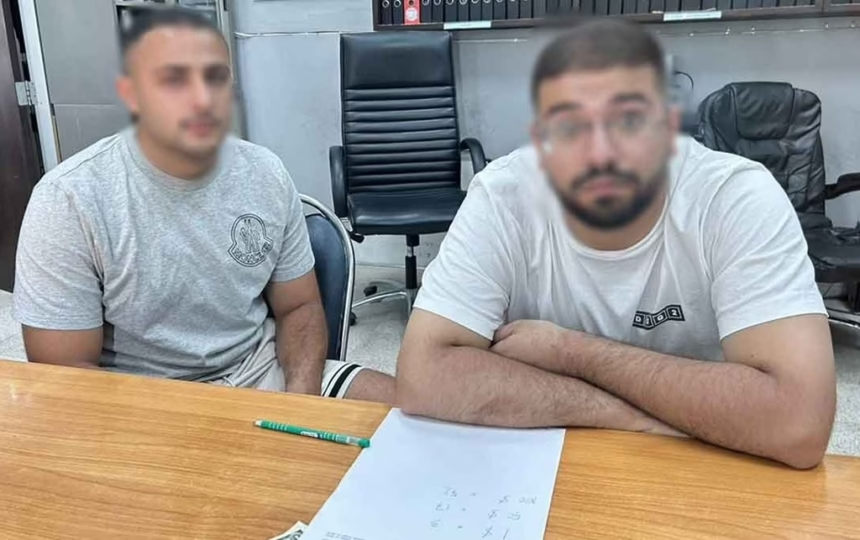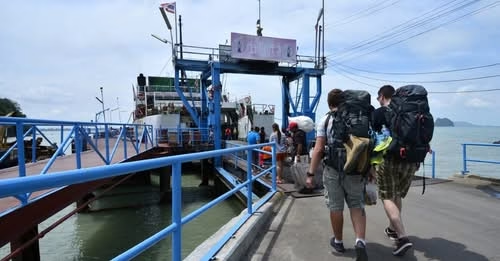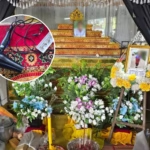SURAT THANI – Two Israelis were arrested on Koh Samui after allegedly swapping counterfeit US dollars for Thai baht at Samui Airport. The case has raised fresh concerns about money security and the behaviour of some foreign visitors, while adding fuel to ongoing disputes over foreign-run businesses on Koh Phangan.
Police identified the suspects as Matan Moshe, 25, and Omer Sarusi, 27. Officers from Bo Phut Police Station and Surat Thani Immigration detained the pair on 11 October at a rented property in Tambon Bophut.
Warrants issued by the Koh Samui Provincial Court led to a search that uncovered counterfeit notes worth US$5,653. The seizure included 48 fake $100 bills, 17 forged $50 bills, and three counterfeit $1 notes, according to police records.
The scheme began on 6 October at a Government Savings Bank currency counter at Samui Airport. The two men approached the kiosk at different times. Moshe exchanged five $50 notes for 7,280 baht. Sarusi traded ten $50 notes for 14,560 baht.
The bank later confirmed the notes cleared the initial machine check. A GSB spokesperson said the device software had not been updated for months. Head office staff in Bangkok detected the fakes three days later during further checks, then alerted local police.

Israelis Claim Cash Came From Friends
Investigators moved quickly. Using CCTV from the terminal, transaction data, and immigration logs, police tracked the suspects to a beachside guesthouse in Bophut, a busy area near Chaweng.
Officers found more counterfeit bills in their luggage and documents showing a recent arrival from Tel Aviv. During questioning, the men said they did not know the notes were fake and claimed they came from friends at home. Sarusi told officers, through a translator, that they were in Thailand to relax, not to cause trouble.
Senior officers were not convinced. Pol Col Thanawat Kaewngam, the Bo Phut Police Superintendent, called the explanation unlikely. He cited the coordinated exchanges and the high standard of the forgeries, including holograms and watermarks that beat basic detectors.
Both men now face charges under the Currency Act for counterfeiting and possession with intent to circulate. A conviction could bring up to 15 years in prison and fines of over 300,000 baht.
The case has been transferred to Surat Thani Provincial Court, with an arraignment expected next week. The Israeli Embassy in Bangkok has been informed. Consular staff are assisting, though no public statement has been issued.
This case follows a pattern seen this year. In January, police in Pattaya arrested an Israeli national who tried to pass fake $50 bills at a money changer. On 7 October on Koh Phangan, a 49-year-old Israeli woman, named as Mrs Ayele, allegedly swapped a counterfeit $100 for 3,140 baht and tried to flee.
These incidents have unsettled a tourism sector that hosted over 40 million visitors last year and delivers around 12% of the national GDP. Koh Samui welcomes about 3 million visitors a year. Local operators fear repeated scams could dent their appeal.
Israeli Tourists Stir Tensions on Koh Phangan
The Koh Samui arrests have also sharpened tensions on Koh Phangan, a short ferry ride away. The island is famous for Full Moon Parties and wellness retreats. Officials and business owners there say a small share of Israeli visitors are causing friction, and they accuse some foreign operators of skirting rules while reshaping the island economy.
Tourism on Koh Phangan has soared, with growth exceeding 200% in two years. Immigration data shows 4,030 Israelis in Surat Thani province at present. Of these, 2,548 are on Koh Phangan, including 987 long-term residents. Some 349 hold business visas.
New Israeli-focused ventures have multiplied, from Hebrew-sign restaurants and kosher villas to guided tours and a Chabad centre. One long-time expat bar owner, asking not to be named, said it feels like a slice of Tel Aviv has arrived. Good for turnover, he said, but it is altering the island’s character.
Local leaders list a range of complaints. Narumol Maisopha, who heads the Koh Phangan Hotel and Tourism Association, described growing friction linked to late-night party noise, litter during peak events, and disrespect for local customs.
View this post on Instagram
In May, a clip went viral showing an Israeli tourist, Kesem Cohen, refusing to remove his shoes in a café and telling staff, “My money built your country.” The video, posted on the “Koh Phangan Conscious Community” page, drew millions of views and calls for deportation.
Other incidents include bar fights and aggressive bargaining. Residents say a vocal minority acts with a sense of superiority.
Officials are also probing nominee arrangements, where foreigners allegedly use Thai nationals to bypass the Land Code Act on property ownership. Early checks by the Royal Thai Police, the Land Department, and the Department of Business Development have flagged Israeli-linked ventures.
The ventures include car rental fleets, unlicensed tour businesses, and high-end rentals registered as local firms. Surat Thani Governor Teeruth Supawiboonpol chaired an urgent meeting this week. He said a task force will audit land, companies, and visas, and warned that rules apply to all.
Save Koh Phangan Page
Koh Phangan District Chief Suriya Boonpan reported 2,627 Israeli visa extensions by late September, with 181 business visas and 152 student visas that locals worry may be used as cover. A “Save Koh Phangan” social campaign has grown to 50,000 followers.
The group shares images of Hebrew signs and alleged nominee deals, and compares the situation with Pai in Mae Hong Son. There, a surge of Israeli arrivals in 2025 led to a government review and talks with the Israeli Embassy. The fear on both islands is a patchwork of enclaves that price out Thai residents and breed tension.
Thai business owners say they are losing ground. Pairot Charoenwan, a bungalow operator who helped front an anti-foreign mafia” push in 2016 after a shooting linked to rival Russian bars, said local firms cannot match the capital or closed marketing networks of some foreign players.
Recent cases show a broader trend. Police raided a Russian-run illegal motorbike rental in September, shut a German-Myanmar e-bike tour scam, and broke up a European money-laundering scheme with cleaning services as a front. On Koh Phangan, locals say these episodes are signs of rapid growth putting pressure on water, roads, and community ties.
There are positive voices too. Supporters say the Israeli market brings energy and spending. The tourism board estimates Israelis injected about $150 million into Surat Thani last year. The Israeli Ambassador urged respectful conduct in May. Ambassador Orna Sagiv also visited Pai to calm tensions. Many Thai residents enjoy the cultural mix, from klezmer nights to joint beach clean-ups.
As sunset colours Bottle Beach, the issue feels finely balanced. For every suspect caught with fake currency, thousands of Israelis visit for post-army trips or remote work. Governor Teeruth put it plainly.
Tourism depends on harmony. Lose that, and everyone pays the price. With high season near, the islands face a test that could bring either calm or deeper division.

















